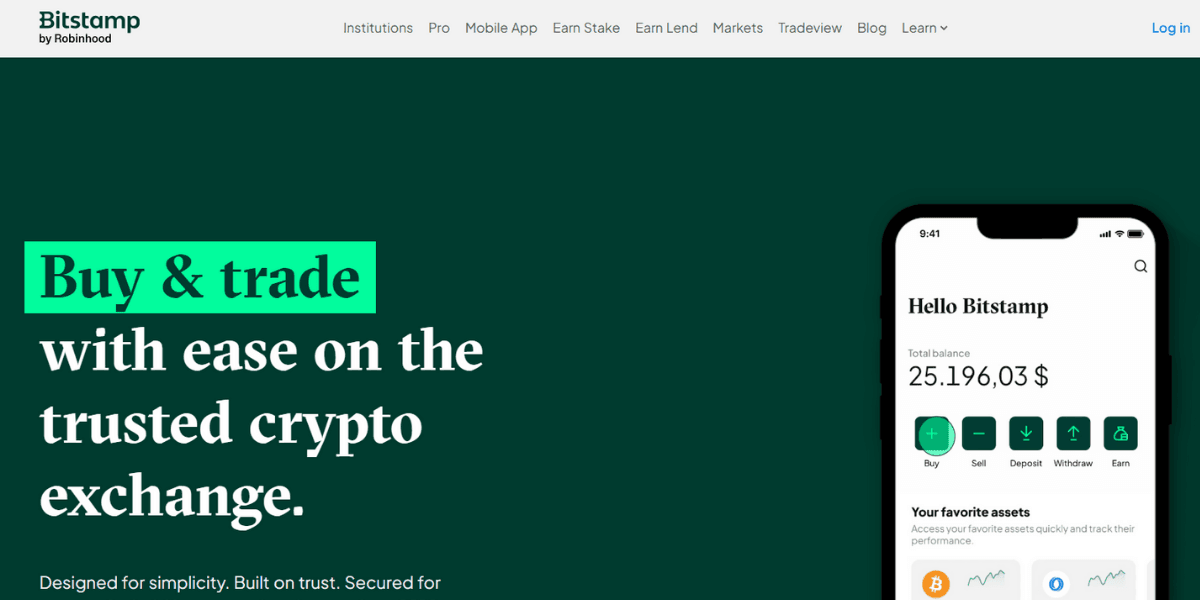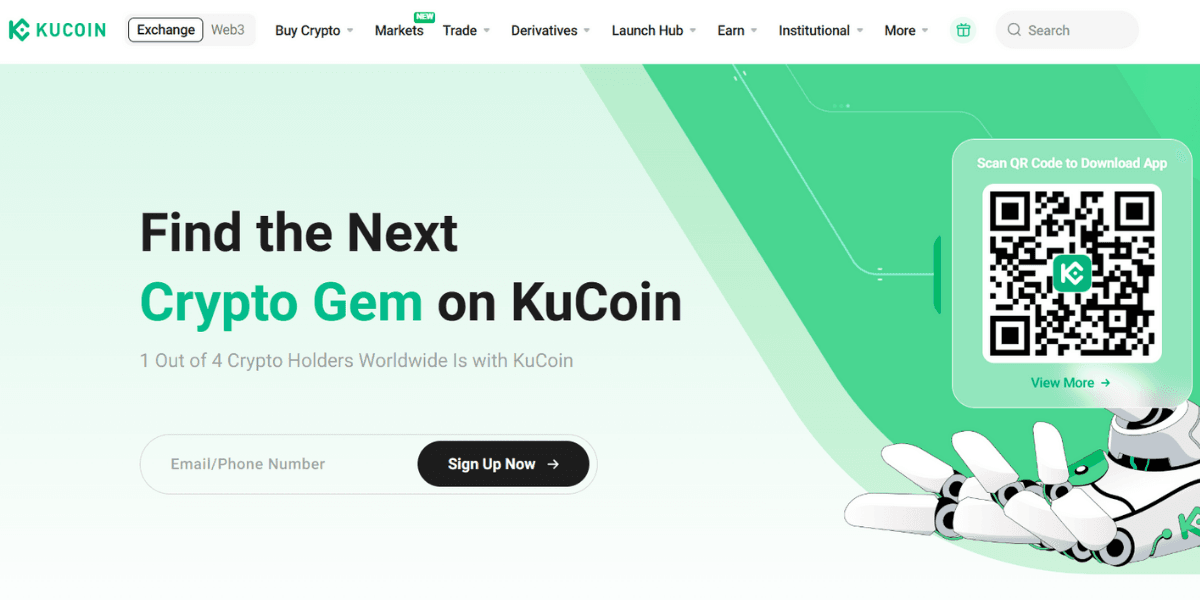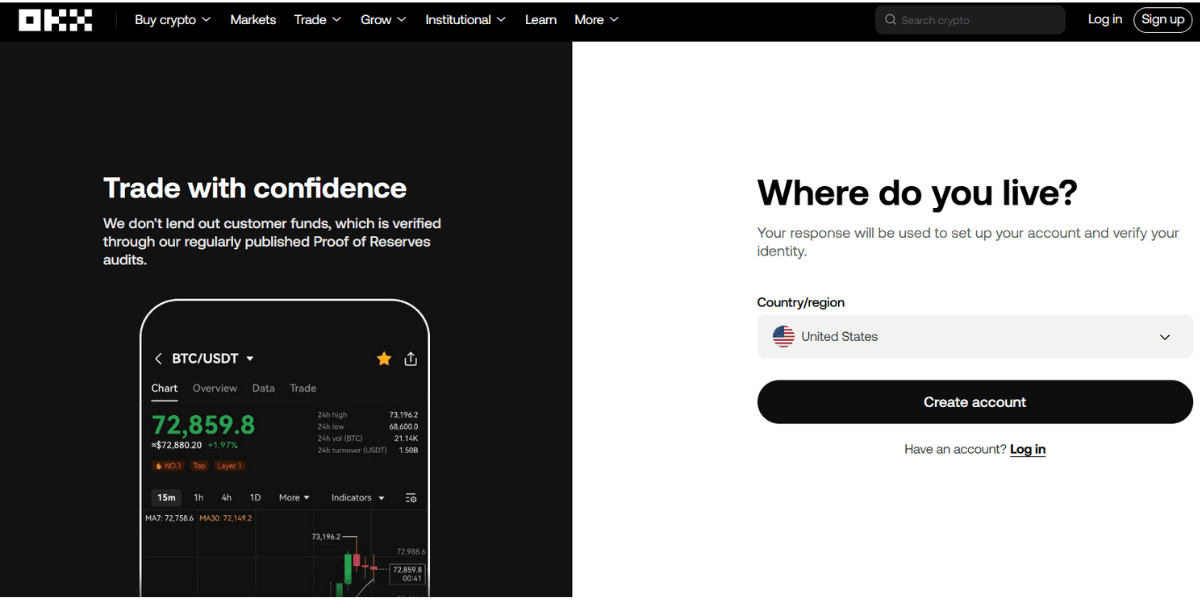6 Best Bitstamp Alternatives
Bitstamp has been around since 2011 and remains a trusted platform, but some traders find its limited asset selection, higher card deposit fees, and lack of proof-of-reserves restrictive. If you want to buy Bitcoin or explore a wider set of assets, it’s worth checking out alternatives to Bitstamp that offer more coins, lower fees, and broader tools.

What is Bitstamp, and how does it work?

Bitstamp is one of the industry’s oldest exchanges, licensed in both the EU and the US. It provides spot trading, fiat onramps (USD, EUR, GBP), and secure storage, with features like 2FA and cold wallets.
However, it caps users at ~130 coins, lacks derivatives, and has relatively high card deposit fees (4%). That’s why many traders explore Bitstamp alternatives to unlock more assets, tools, and competitive pricing.
Best Bitstamp Alternatives Summary
For those searching for the best alternatives to Bitstamp, we provide a comprehensive table comparing its main competitors head-to-head.
Exchange | Fee Model | Entry-Level Fees | Highest Volume / VIP Discounts | Coins Listed | GEO Coverage | |
CEX.IO | Flat % by 30D volume | ≤$10K: 0.25% | ≤$20M: 0.10% | 310+ | ~195 countries | Credit/debit cards, e-wallets, bank transfers, PayPal (US only) |
Kraken | Maker–Taker (volume-based) | ~0.26% maker / 0.16% taker (varies) | Down to ~0.00% maker / 0.10% taker | 290+ | ~190 countries | Bank transfers (SWIFT, SEPA, FedWire), credit/debit cards |
Binance | Maker–Taker + BNB discounts | Regular user: 0.10% / 0.10% (or 0.075% / 0.075% with BNB) | VIP 9: 0.011% / 0.023% | 416+ | ~180 countries | Debit/credit cards, bank transfers, P2P trading, e-wallets |
Bybyt | VIP tiers (volume or asset balance) | Spot VIP 0: 0.10% / 0.10% Derivatives: 0.055% / 0.020% | Supreme VIP: Spot 0.045% / 0.030%, Derivatives 0.030% / 0.000% | 740+ | ~160 countries | Debit/credit cards, bank transfers, P2P trading, 65+ fiat currencies |
KuCoin | Maker–taker (KCS discounts) | 0.10% maker/taker | -0.005% maker / 0.020% taker (VIP 12) | 750+ | ~200 countries | Crypto deposits, third-party fiat on-ramps (Simplex, Banxa), P2P trading |
OKX | Maker–taker (VIP tiers) | 0.08% maker / 0.10% taker | -0.005% maker / 0.015% taker (VIP 8) | 350+ | ~180 countries | Debit/credit cards, bank transfers, P2P trading, third-party providers |
Bitstamp (for reference) | Maker–taker | 0.30% maker / 0.40% taker (<$10K 30d volume) | 0.00% maker / 0.03% taker (>$1B 30d volume) | 85+ | ~100 countries | Bank transfers (SEPA, ACH, SWIFT), debit/credit cards, PayPal |
CEX.IO
CEX.IO consistently ranks among the best Bitstamp alternatives in the US, offering global reach and full licensing. Since 2013, it has served millions of customers with reliable fiat-to-crypto access, advanced trading tools, and responsive customer support.
Why do Users like CEX.IO?
Many call it the best Bitstamp alternative because it’s user-friendly yet powerful. Its Spot Trading interface is simple enough for beginners, while the CEX.IO Wallet provides secure, free custody. Add in responsive 24/7 support, transparent fees, and web + mobile access, and it’s clear why users rate it highly.
Features
CEX.IO blends accessibility with pro-level tools. Spot Trading makes it simple to buy and sell, while Margin Trading supports up to 20x exposure (far higher than KuCoin’s 5x).
The Crypto Converter simplifies swapping fiat-to-crypto or crypto-to-crypto without charts, ideal for first-timers. Beginners also appreciate access to cryptocurrency prices pages, which help track markets before they trade.
Payment Methods
Compared to Bitstamp, CEX.IO offers more flexibility: debit/credit cards, PayPal (though for US-based users only), Venmo, Discover, and even e-wallets like Wise and Payoneer. Bank transfers (SEPA, SWIFT, Faster Payments) are available via the Wallet function. While not always instant, the variety easily outpaces Bitstamp’s limited coverage.
CEX.IO Pros and Cons
CEX.IO stood out for its intuitive interface, strong fiat coverage, and transparent pricing model. It also gives access to live cryptocurrency prices, helping beginners make informed choices.
On the downside, Wallet-based bank transfers may feel less direct than instant options, but it’s a minor issue compared to Bitstamp’s 4% card fee.
Pros:
- Licensed in the U.S. and Europe
- Free CEX.IO Wallet
- Spot + Margin Trading (20x leverage)
- Wide payment support, including PayPal
- Transparent fees
- Handy crypto price tracking tools
Cons:
- Bank transfers tied to Wallet
- No native token discounts
Buy crypto with a debit or credit card
Purchase top cryptocurrencies
Become a crypto owner using your debit or credit card.
Easily withdraw your money
Withdraw your funds to a card or bank account in a few clicks.

Kraken
Kraken is often seen as one of the strongest alternatives for Bitstamp, especially for traders who want breadth. Launched in 2011, it offers hundreds of cryptocurrencies, strong US licensing, and unmatched security standards.
Features
Kraken provides staking, margin (10x), and futures, which Bitstamp lacks entirely. Unlike OKX, it doesn’t run a launchpad or NFT marketplace, but compared to CEX.IO, it feels less beginner-friendly. Still, Kraken’s educational library and institutional OTC desk make it more versatile than Bitstamp for advanced traders.
Payment Methods
Kraken supports ACH, FedWire, SWIFT, SEPA, and cards in some regions. Compared to Bitstamp, it offers broader U.S. support and cheaper fiat transfers, though it lacks PayPal integration, which CEX.IO provides, at least for US-based customers.
Kraken Pros and Cons
We liked Kraken’s scale and security, particularly its Proof-of-Reserves audits, which Bitstamp still lacks. The main drawback is its steeper learning curve for beginners and fewer casual payment methods than CEX.IO.
Pros:
- Over 200 coins
- Staking + futures trading
- Proof-of-Reserves audits
- Strong global licensing
- Institutional-grade tools
Cons:
- Interface harder for beginners
- Fewer casual fiat options than peers
Binance
Binance remains the largest exchange globally and one of the most common Bitstamp alternatives. With over 350 cryptocurrencies, deep liquidity, and a wide array of trading products, it appeals to active traders.
Features
Binance goes beyond Bitstamp with futures, options, and a massive altcoin catalog. Its Launchpad for new tokens has no counterpart at Bitstamp, making it attractive to early adopters.
Educational tools like Binance Academy (we found similar at CEX.IO) also stand out, giving beginners a more structured learning curve than Bitstamp provides. Still, US-based enthusiasts must use Binance US, which has far fewer assets than the global version.
Payment Methods
Binance supports cards, SEPA, SWIFT, and P2P trading, though methods vary by region. Compared with Bitstamp’s limited fiat coverage, Binance offers better flexibility, especially with P2P for local payment methods. However, it doesn’t support PayPal, unlike CEX.IO, and in some regions, card fees can still feel steep.
Binance Pros and Cons
The standout here is choice and liquidity, but US restrictions and a sometimes overwhelming interface are drawbacks. In our tests, its tools felt too complex for casual buyers who just want to buy Bitcoin quickly. CEX.IO remains a simpler and more accessible platform.
Pros:
- 350+ coins
- Futures, options, and margin
- Strong liquidity
- Launchpad for new tokens
- Large global reach
Cons:
- Binance US has limited assets
- Interface can overwhelm newcomers
Bybyt
Bybit has carved out a reputation as a Bitstamp alternative for derivatives and low fees. It offers perpetual futures with up to 100x exposure and supports copy trading, something Bitstamp doesn’t provide. With constant promotions, bonuses, and competitive spreads, it appeals to active and speculative traders.
Payment Methods
Bybit supports cards, bank transfers, and P2P trading. Compared to Bitstamp’s reliance on SEPA and card purchases, Bybit’s P2P market gives users in Asia, Africa, and Latin America more local options. However, it lacks PayPal or Venmo integration, where CEX.IO has a clear advantage for US-based traders.
Features
Where Bitstamp sticks to spot trading, Bybit adds futures, staking, bots, and a Launchpad for token sales. We noticed that its copy trading is helpful for beginners who want to mirror strategies, something Bitstamp and Kraken don’t offer. Still, it can feel overly complex compared with the straightforward setup of CEX.IO.
Bybit Pros and Cons
We appreciated Bybit’s low fees and advanced futures suite, especially for experienced traders. Still, for casual traders, the advanced dashboards and leverage products may feel intimidating. Platforms like CEX.IO bridge that gap better.
Pros:
- Perpetual futures (100x)
- Copy trading tools
- P2P trading markets
- Low spreads and fees
- Token Launchpad
Cons:
- Overly complex for newcomers
- Regional restrictions apply
KuCoin

KuCoin is a global exchange often cited in lists of alternatives for Bitstamp, thanks to its wide selection of 700+ coins. It’s especially popular with altcoin hunters and those who want to explore new tokens early. Its trading bot features also give automation fans more flexibility.
Features
KuCoin excels in altcoin diversity, derivatives, and trading bots, which Bitstamp lacks. However, its 5x margin feels limited when compared to CEX.IO’s 20x. While it’s innovative with features like lending and lotteries, its lack of US licensing and Proof-of-Reserves transparency can be dealbreakers for risk-averse users.
Payment Methods
KuCoin supports cards, P2P trading, and bank transfers, giving more variety than Bitstamp. However, it doesn’t offer PayPal, Venmo, or Discover support like CEX.IO. Its P2P marketplace is strong for global accessibility, but can feel less secure for beginners compared to direct bank and card integrations.
KuCoin Pros and Cons
Its breadth of coins and tools is unmatched, but regulatory gaps and the absence of a US licensing limit its appeal compared to Kraken or Bitstamp. Altcoin fans will find it stronger than Bitstamp, but beginners may prefer a more straightforward platform.
Pros:
- 700+ coins
- Derivatives + trading bots
- P2P and global coverage
- Active community
- Competitive fees
Cons:
- No US licensing
- Limited fiat support
OKX

OKX is a major global player frequently mentioned in alternatives for Bitstamp guides. It blends advanced trading tools with DeFi access, making it one of the most versatile platforms on the market. With 300+ cryptocurrencies and strong liquidity, it’s a serious competitor for experienced traders.
Features
Compared to Bitstamp’s straightforward spot setup, OKX adds futures, options, staking, DeFi services, and an NFT marketplace. This makes it attractive for users who want exposure beyond trading. Still, it lacks PayPal support, and its complexity is a barrier for beginners, whereas CEX.IO is more accessible.
Payment Methods
OKX supports cards, bank transfers, and P2P, offering broader access than Bitstamp’s card and SEPA focus. However, its fiat support isn’t polished, especially for US users who benefit from PayPal, Venmo, and Discover.
OKX Pros and Cons
We liked OKX for its deep product set, from derivatives to NFTs, making it more diverse than Bitstamp. But for casual users, it can feel overwhelming. If you’re after simplicity and fast fiat deposits, CEX.IO or KuCoin may serve you better.
Pros:
- Futures + options trading
- NFT marketplace and DeFi tools
- 300+ coins with strong liquidity
- Large global reach
- P2P fiat support
Cons:
- No US licensing
- Complex for casual traders
Buy crypto instantly with card
Buy Bitcoin, Ethereum and other top cryptocurrencies securely with your debit or credit card. Fast purchases, low fees, easy withdrawals.

FAQ
How to choose a Bitstamp alternative?
When searching for alternatives to Bitstamp, consider what this platform lacks, such as a broader coin selection, lower card fees, or advanced features. Prioritizing regulation, payment methods, and ease of use is always a good idea. For US-based users, CEX.IO stands out with PayPal support, higher-margin trading, and a free wallet, making it the most practical pick.
How to buy crypto without Bitstamp?
You can buy crypto on regulated exchanges like CEX.IO, Coinbase, or Kraken, or through decentralized platforms. Centralized platforms are usually safer for beginners thanks to stronger compliance, fiat onramps, and better liquidity.
Do other exchanges have better safety than Bitstamp?
Yes, some do. Kraken offers Proof-of-Reserves audits, and CEX.IO adds strong licensing and secure wallets. While Bitstamp has solid safeguards, competitors may provide more transparency or audit-based reassurance.
Who has lower fees than Bitstamp?
Bitstamp’s entry-level fees start at 0.30% maker and 0.40% taker, which are higher than many competitors. Exchanges like Binance, KuCoin, and OKX begin at just 0.10% per trade, while CEX.IO also offers lower starting rates of 0.25% and discounts for high-volume traders. Bybit and MEXC go further with aggressive VIP tiers. Overall, several platforms undercut Bitstamp’s standard fees, especially for active traders.
What is the best Bitstamp alternative in the US?
For US-based traders, CEX.IO is the best Bitstamp alternative due to its licensing, PayPal integration, wide fiat coverage, and free wallet. Its beginner-friendly interface also makes onboarding easier than on Kraken or Binance US.
How do I choose the right crypto exchange?
Check for regulation, licensing, and user protections first. Next, look at the interface, ease of deposits, fiat support, and whether it lists the coins you want. For beginners, prioritize responsive customer service and tools like crypto converters and live price pages.
Are all these platforms regulated in the US?
No. CEX.IO, Coinbase, Gemini, and Kraken are licensed for US-based enthusiasts. Binance operates separately as Binance US. KuCoin and OKX aren’t licensed in the US, while Bybit is limited in availability.



